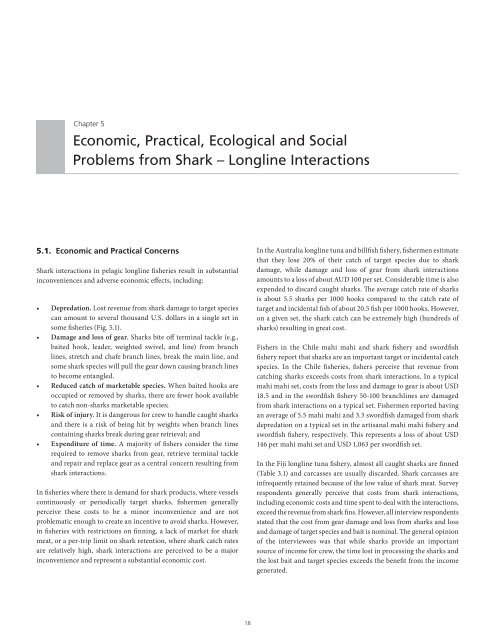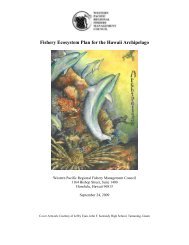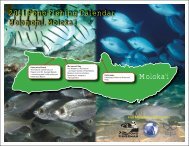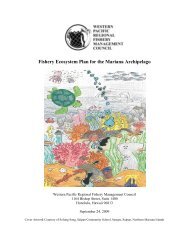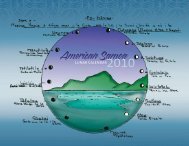Shark Depredation and Unwanted Bycatch in Pelagic Longline
Shark Depredation and Unwanted Bycatch in Pelagic Longline
Shark Depredation and Unwanted Bycatch in Pelagic Longline
You also want an ePaper? Increase the reach of your titles
YUMPU automatically turns print PDFs into web optimized ePapers that Google loves.
Chapter 5<br />
Economic, Practical, Ecological <strong>and</strong> Social<br />
Problems from <strong>Shark</strong> – Longl<strong>in</strong>e Interactions<br />
5.1. Economic <strong>and</strong> Practical Concerns<br />
<strong>Shark</strong> <strong>in</strong>teractions <strong>in</strong> pelagic longl<strong>in</strong>e fisheries result <strong>in</strong> substantial<br />
<strong>in</strong>conveniences <strong>and</strong> adverse economic effects, <strong>in</strong>clud<strong>in</strong>g:<br />
• <strong>Depredation</strong>. Lost revenue from shark damage to target species<br />
can amount to several thous<strong>and</strong> U.S. dollars <strong>in</strong> a s<strong>in</strong>gle set <strong>in</strong><br />
some fisheries (Fig. 5.1).<br />
• Damage <strong>and</strong> loss of gear. <strong>Shark</strong>s bite off term<strong>in</strong>al tackle (e.g.,<br />
baited hook, leader, weighted swivel, <strong>and</strong> l<strong>in</strong>e) from branch<br />
l<strong>in</strong>es, stretch <strong>and</strong> chafe branch l<strong>in</strong>es, break the ma<strong>in</strong> l<strong>in</strong>e, <strong>and</strong><br />
some shark species will pull the gear down caus<strong>in</strong>g branch l<strong>in</strong>es<br />
to become entangled.<br />
• Reduced catch of marketable species. When baited hooks are<br />
occupied or removed by sharks, there are fewer hook available<br />
to catch non-sharks marketable species;<br />
• Risk of <strong>in</strong>jury. It is dangerous for crew to h<strong>and</strong>le caught sharks<br />
<strong>and</strong> there is a risk of be<strong>in</strong>g hit by weights when branch l<strong>in</strong>es<br />
conta<strong>in</strong><strong>in</strong>g sharks break dur<strong>in</strong>g gear retrieval; <strong>and</strong><br />
• Expenditure of time. A majority of fishers consider the time<br />
required to remove sharks from gear, retrieve term<strong>in</strong>al tackle<br />
<strong>and</strong> repair <strong>and</strong> replace gear as a central concern result<strong>in</strong>g from<br />
shark <strong>in</strong>teractions.<br />
In fisheries where there is dem<strong>and</strong> for shark products, where vessels<br />
cont<strong>in</strong>uously or periodically target sharks, fishermen generally<br />
perceive these costs to be a m<strong>in</strong>or <strong>in</strong>convenience <strong>and</strong> are not<br />
problematic enough to create an <strong>in</strong>centive to avoid sharks. However,<br />
<strong>in</strong> fisheries with restrictions on f<strong>in</strong>n<strong>in</strong>g, a lack of market for shark<br />
meat, or a per-trip limit on shark retention, where shark catch rates<br />
are relatively high, shark <strong>in</strong>teractions are perceived to be a major<br />
<strong>in</strong>convenience <strong>and</strong> represent a substantial economic cost.<br />
In the Australia longl<strong>in</strong>e tuna <strong>and</strong> billfish fishery, fishermen estimate<br />
that they lose 20% of their catch of target species due to shark<br />
damage, while damage <strong>and</strong> loss of gear from shark <strong>in</strong>teractions<br />
amounts to a loss of about AUD 100 per set. Considerable time is also<br />
expended to discard caught sharks. The average catch rate of sharks<br />
is about 5.5 sharks per 1000 hooks compared to the catch rate of<br />
target <strong>and</strong> <strong>in</strong>cidental fish of about 20.5 fish per 1000 hooks. However,<br />
on a given set, the shark catch can be extremely high (hundreds of<br />
sharks) result<strong>in</strong>g <strong>in</strong> great cost.<br />
Fishers <strong>in</strong> the Chile mahi mahi <strong>and</strong> shark fishery <strong>and</strong> swordfish<br />
fishery report that sharks are an important target or <strong>in</strong>cidental catch<br />
species. In the Chile fisheries, fishers perceive that revenue from<br />
catch<strong>in</strong>g sharks exceeds costs from shark <strong>in</strong>teractions. In a typical<br />
mahi mahi set, costs from the loss <strong>and</strong> damage to gear is about USD<br />
18.5 <strong>and</strong> <strong>in</strong> the swordfish fishery 50-100 branchl<strong>in</strong>es are damaged<br />
from shark <strong>in</strong>teractions on a typical set. Fishermen reported hav<strong>in</strong>g<br />
an average of 5.5 mahi mahi <strong>and</strong> 3.3 swordfish damaged from shark<br />
depredation on a typical set <strong>in</strong> the artisanal mahi mahi fishery <strong>and</strong><br />
swordfish fishery, respectively. This represents a loss of about USD<br />
146 per mahi mahi set <strong>and</strong> USD 1,063 per swordfish set.<br />
In the Fiji longl<strong>in</strong>e tuna fishery, almost all caught sharks are f<strong>in</strong>ned<br />
(Table 3.1) <strong>and</strong> carcasses are usually discarded. <strong>Shark</strong> carcasses are<br />
<strong>in</strong>frequently reta<strong>in</strong>ed because of the low value of shark meat. Survey<br />
respondents generally perceive that costs from shark <strong>in</strong>teractions,<br />
<strong>in</strong>clud<strong>in</strong>g economic costs <strong>and</strong> time spent to deal with the <strong>in</strong>teractions,<br />
exceed the revenue from shark f<strong>in</strong>s. However, all <strong>in</strong>terview respondents<br />
stated that the cost from gear damage <strong>and</strong> loss from sharks <strong>and</strong> loss<br />
<strong>and</strong> damage of target species <strong>and</strong> bait is nom<strong>in</strong>al. The general op<strong>in</strong>ion<br />
of the <strong>in</strong>terviewees was that while sharks provide an important<br />
source of <strong>in</strong>come for crew, the time lost <strong>in</strong> process<strong>in</strong>g the sharks <strong>and</strong><br />
the lost bait <strong>and</strong> target species exceeds the benefit from the <strong>in</strong>come<br />
generated.<br />
18


